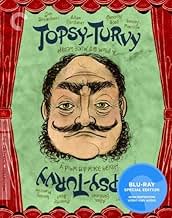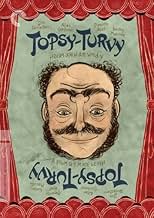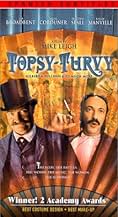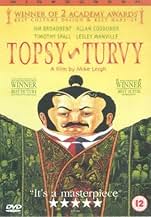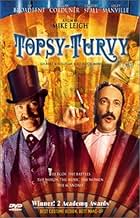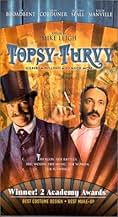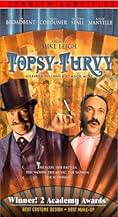AVALIAÇÃO DA IMDb
7,3/10
14 mil
SUA AVALIAÇÃO
Adicionar um enredo no seu idiomaSet in the 1880s, chronicles how during a creative dry spell, the partnership of the legendary musical/theatrical writers Gilbert and Sullivan almost dissolves, before they turn it all aroun... Ler tudoSet in the 1880s, chronicles how during a creative dry spell, the partnership of the legendary musical/theatrical writers Gilbert and Sullivan almost dissolves, before they turn it all around and write the Mikado.Set in the 1880s, chronicles how during a creative dry spell, the partnership of the legendary musical/theatrical writers Gilbert and Sullivan almost dissolves, before they turn it all around and write the Mikado.
- Ganhou 2 Oscars
- 13 vitórias e 28 indicações no total
Bill Neenan
- Cook
- (as William Neenan)
Avaliações em destaque
Not being a big fan of opera (of the comedic variety or otherwise), I chose to watch this movie as a period piece, hoping to see a lot of eccentric characters putting on even more eccentric theatre. That was easy, since the trailer for the film points in that direction entirely.
What I didn't expect was a thoroughly entrancing inside view of the Victorian theatre. Not to mention comprehensive. Everyone is covered in this - from the stage boy through the chorus through the leads and producers and assistant directors. The telling of the complex relationships between the directors (Gilbert and Sullivan) and the leads is particularly poignant - whether dealing with the actors' considerable egos or their individual popularity among the chorus, nothing presented doesn't ring true.
I loved everything about this movie. It's a great story, told wonderfully by all involved. It is truly a film of much love and craft.
And I expect I'll be attending the next run of the Mikado next time it comes to town.
What I didn't expect was a thoroughly entrancing inside view of the Victorian theatre. Not to mention comprehensive. Everyone is covered in this - from the stage boy through the chorus through the leads and producers and assistant directors. The telling of the complex relationships between the directors (Gilbert and Sullivan) and the leads is particularly poignant - whether dealing with the actors' considerable egos or their individual popularity among the chorus, nothing presented doesn't ring true.
I loved everything about this movie. It's a great story, told wonderfully by all involved. It is truly a film of much love and craft.
And I expect I'll be attending the next run of the Mikado next time it comes to town.
Gilbert and Sullivan are a successful musical team writing their shows for the Savoy Hotel in London. However Sullivan is tired and is suffering from ill-health. During a bad bout he resolves to no longer write for the Savoy with Gilbert but instead to recover in France and then to strike out alone and write a grand opera. Gilbert meanwhile, is showing signs of fatigue coming up with plots that use the same devices to the same ends. However the two are contractually obliged to continue their relationship, a prospect both seem ill at ease with until Gilbert takes an afternoon off at an exhibition of Japanese culture, sowing the seeds of inspiration for The Mikado.
I honestly had never even heard of this film until the television premier in 2002, if you had told me Mike Leigh had made a film on such subject matter I would likely have laughed down my sleeve at such a suggestion. However I gave this a watch despite the fact I know little (or care little) for the works of Gilbert and Sullivan and worries bout the fact it was 160 odd minutes long! However the plot is sufficiently well delivered to take those who only know a little about the pair to keep up. By taking the snapshot of the Mikado to show their relationship the film takes away what could have been a rough, sprawling epic the snapshot works much better. The weaving of the production into the narrative, rather than all at the end, means that both sets of fans will be happy there is enough music to please those who came for that, but also enough plot within to drive the film.
Leigh does very well, mixing humour and telling drama with the music of the show. The production of the film (and the production!) are both very good and the detail is fine. The cast are all excellent. Broadbent is good as the straight-laced Gilbert and his chemistry with the enjoyable Corduner works throughout. The support cast are all good in singing and non-singing scenes I was surprised to see Spall carrying the tunes so well!
Overall this is a good film but I doubt that Gilbert & Sullivan will be much of a draw even now that it is on TV. However if you have the chance to watch it then you should push through your reservations and give it a try it is engaging and humourous enough to overcome a lack of knowledge (or interest) in the pair's work.
I honestly had never even heard of this film until the television premier in 2002, if you had told me Mike Leigh had made a film on such subject matter I would likely have laughed down my sleeve at such a suggestion. However I gave this a watch despite the fact I know little (or care little) for the works of Gilbert and Sullivan and worries bout the fact it was 160 odd minutes long! However the plot is sufficiently well delivered to take those who only know a little about the pair to keep up. By taking the snapshot of the Mikado to show their relationship the film takes away what could have been a rough, sprawling epic the snapshot works much better. The weaving of the production into the narrative, rather than all at the end, means that both sets of fans will be happy there is enough music to please those who came for that, but also enough plot within to drive the film.
Leigh does very well, mixing humour and telling drama with the music of the show. The production of the film (and the production!) are both very good and the detail is fine. The cast are all excellent. Broadbent is good as the straight-laced Gilbert and his chemistry with the enjoyable Corduner works throughout. The support cast are all good in singing and non-singing scenes I was surprised to see Spall carrying the tunes so well!
Overall this is a good film but I doubt that Gilbert & Sullivan will be much of a draw even now that it is on TV. However if you have the chance to watch it then you should push through your reservations and give it a try it is engaging and humourous enough to overcome a lack of knowledge (or interest) in the pair's work.
Mike Leigh's gloriously entertaining film, `Topsy-Turvy,' offers a wise and witty slice of musical theater history. Set in 1880's London, the movie chronicles the extraordinary personal and professional relationship between two giants of the 19th Century entertainment world, lyricist `Willie' Gilbert and composer Arthur Sullivan. The screenplay, wisely, chooses to pick up the tale not at the very beginning of their collaborative career - tracing its rise and fall as many biopics would do - but rather at the point where the team has already garnered international fame and success but seems of late to be experiencing a bit of creative stagnation. Sullivan, tiring of the seemingly trivial nature of the librettos they've been producing, wants to break away and embark on his own to produce a work of more `weighty' merit. Gilbert, on the other hand, delights in his success and, although bothered by comments in the press that his work has begun to repeat itself, initially resists Sullivan's plea that they abandon their hitherto winning formula.
Thus, the conflict between the two men of creative genius plays itself out against the fascinating backdrop of a deliciously recreated vision of the theatrical world of a hundred-odd years ago. Just as important to the film as the two main characters is the rich assortment of secondary players - theater proprietors, company actors, wives, lovers and parents - who swirl around the principals and provide a colorful tapestry to match the exquisite art direction and costuming that adorn the film. In addition, Leigh incorporates clever references to some of the technological marvels just making their appearance at the time: telephones, reservoir pens and luxury hotels with baths for every room!
Leigh's pacing is admirably unhurried and relaxed. So rich is the detail of his vision that fully thirty-five minutes elapse before the two lead characters even have their first scene together. In addition, the inspiration for `The Mikado' - ostensibly the centerpiece of the film's plot - doesn't strike Gilbert until well into the second hour. Yet, the film never falters in interest, least of all when Leigh devotes long stretches of footage to showing us the actors rehearsing their parts or having us eavesdrop on some behind-the-scenes salary negotiations or discussions of artistic differences. This is the real triumph of the film: Leigh opens up a world to us by letting us see the fascinating nuts-and-bolts aspects of the creative process to which we, as members of a theatre audience, are rarely privy. He also is not afraid to linger long over many a beautiful reproduction of the musical pieces themselves. Leigh can count his film a success in that it makes us want to rush out and catch a performance of one of these operettas ourselves.
The film would not be the splendid success it is were it not for the dazzling performances of its amazingly large cast. Jim Broadbent and Allan Corduner are perfection as the good-natured but often antagonistic partners, never playing the humor too broadly or violating the spirit of elite British gentility even in their most conflict-laden moments.
Indeed, it is this very quality of quiet subtlety that permeates every aspect of `Topsy-Turvy' and that makes it the wholly satisfying and entertaining film it is.
Thus, the conflict between the two men of creative genius plays itself out against the fascinating backdrop of a deliciously recreated vision of the theatrical world of a hundred-odd years ago. Just as important to the film as the two main characters is the rich assortment of secondary players - theater proprietors, company actors, wives, lovers and parents - who swirl around the principals and provide a colorful tapestry to match the exquisite art direction and costuming that adorn the film. In addition, Leigh incorporates clever references to some of the technological marvels just making their appearance at the time: telephones, reservoir pens and luxury hotels with baths for every room!
Leigh's pacing is admirably unhurried and relaxed. So rich is the detail of his vision that fully thirty-five minutes elapse before the two lead characters even have their first scene together. In addition, the inspiration for `The Mikado' - ostensibly the centerpiece of the film's plot - doesn't strike Gilbert until well into the second hour. Yet, the film never falters in interest, least of all when Leigh devotes long stretches of footage to showing us the actors rehearsing their parts or having us eavesdrop on some behind-the-scenes salary negotiations or discussions of artistic differences. This is the real triumph of the film: Leigh opens up a world to us by letting us see the fascinating nuts-and-bolts aspects of the creative process to which we, as members of a theatre audience, are rarely privy. He also is not afraid to linger long over many a beautiful reproduction of the musical pieces themselves. Leigh can count his film a success in that it makes us want to rush out and catch a performance of one of these operettas ourselves.
The film would not be the splendid success it is were it not for the dazzling performances of its amazingly large cast. Jim Broadbent and Allan Corduner are perfection as the good-natured but often antagonistic partners, never playing the humor too broadly or violating the spirit of elite British gentility even in their most conflict-laden moments.
Indeed, it is this very quality of quiet subtlety that permeates every aspect of `Topsy-Turvy' and that makes it the wholly satisfying and entertaining film it is.
George Martin once talked about he and John Lennon once having a drink in a British pub. One of the regulars went over to the jukebox and selected "Yesterday." Lennon sighed, turned to Martin and said, "Don't suppose anyone's going to put in 'I am the Walrus?'" Martin went on to suggest that as frustrated as Lennon was of Paul McCartney's "Granny Music," he also couldn't deny McCartney's talent and the ease with which he came up with unforgettable melodies.
One senses the same kind of rivalry between Arthur Sullivan and William Gilbert in Mike Leigh's "Topsy-Turvy." Gilbert and Sullivan were both famous for their hilarious musical comedies in the mid to late 1880s, especially their early hits "H.M.S. Pinafore" and "The Pirates of Penzance." But the film takes place later in their career and things are not boding well for the duo. Sullivan (Alan Corduner) is growing increasingly frustrated with his collaborations with Gilbert, because he feels he is not growing as a composer. "I'm growing tired of these soufflés with Gilbert and his topsy-turvvydom."
Gilbert (Jim Broadbent) is feeling the crunch himself. His latest production with Sullivan has resulted in questions concerning Gilbert's creative spark, as in whether he has one. If that isn't enough, the Savoy Theatre tells the frustrated Sullivan that he and Gilbert are contractually obligated to one more show. Gilbert presents Sullivan with an idea. Sullivan responds that the idea sounds like a remake of an earlier play.
Then inspiration comes from the most unlikely of places. A Japanese Exhibit is being held in London and Gilbert's wife, Kitty (Lesley Manville) forces him to accompany her. Reluctantly Gilbert goes and, reenergized, he picks up a souvenir Samurai sword. He meets with Sullivan again and tells him his idea: "The Mikado." Thus is born Gilbert and Sullivan's last hit play.
The next half of the film deals with the backstage politics and adventures that go with putting on a production. It is here where "Topsy-Turvy" goes into full gear and really begins to shine. Broadbent and Corduner also shine in their respective roles, as well. And it is here where I really paid attention to Leigh's characterizations. The two never had a very friendly relationship and Sullivan was openly bored with Gilbert's silly plays. I always took it for Gilbert being a really witty and good-humored man, and Sullivan being a snob. But Leigh has Sullivan as a fun-loving hedonist and Gilbert being unpersonable and sarcastic. He uses humor as a weapon. The film forced me to look at the two of them in a new light, and more importantly, I bought it.
But Leigh's real achievement is in presenting his supporting cast as three-dimensional characters. There's Richard Temple (Timothy Spall) who plays the Mikado and suffers near-betrayal at the hands of his mentor, Gilbert. Actresses Jessie Bond (Dorothy Atkinson) and Lenora Braham (Shirley Henderson) personify the reluctant acceptance of wearing a kimono with no corset. Leigh brings the same care to this period drama as he has done for his smaller ensemble pieces.
And care is what "Topsy-Turvy" is all about. As much as Sullivan may frown at Gilbert's wit, he still wants to create the best possible product he can. There's a great scene where Gilbert is explaining "The Mikado" to Sullivan and Sullivan is truly enjoying the story. He's got such a look of glee on his face throughout the scene. Corduner does a great job of contrasting his Sullivan with Broadbent's Gilbert, especially in his scenes with the orchestra as he patiently explains the score with his players.
Broadbent, on the other hand, is an absolute joy as Gilbert. Gilbert may not be a likable character, but he knows what he wants and he is good at what he does. He may be short with everyone and unbending, but he gets results.
Leigh shows a clear love for the theatre here, and the details are amazing all the way from the theatre set to the costumes, nothing is out of place. He also keeps the action moving in the film which totals almost three hours but never feels like it. That's very hard to do.
To be honest, I thought Leigh was jumping on the "Shakespeare in Love" bandwagon, but the films couldn't be more different. "Shakespeare in Love" celebrates love burgeoning creativity. "Topsy-Turvy" deals with the love of creativity itself and shows how people of different temperaments and tastes can still get together and produce greatness.
Topsy-Turvy ****
One senses the same kind of rivalry between Arthur Sullivan and William Gilbert in Mike Leigh's "Topsy-Turvy." Gilbert and Sullivan were both famous for their hilarious musical comedies in the mid to late 1880s, especially their early hits "H.M.S. Pinafore" and "The Pirates of Penzance." But the film takes place later in their career and things are not boding well for the duo. Sullivan (Alan Corduner) is growing increasingly frustrated with his collaborations with Gilbert, because he feels he is not growing as a composer. "I'm growing tired of these soufflés with Gilbert and his topsy-turvvydom."
Gilbert (Jim Broadbent) is feeling the crunch himself. His latest production with Sullivan has resulted in questions concerning Gilbert's creative spark, as in whether he has one. If that isn't enough, the Savoy Theatre tells the frustrated Sullivan that he and Gilbert are contractually obligated to one more show. Gilbert presents Sullivan with an idea. Sullivan responds that the idea sounds like a remake of an earlier play.
Then inspiration comes from the most unlikely of places. A Japanese Exhibit is being held in London and Gilbert's wife, Kitty (Lesley Manville) forces him to accompany her. Reluctantly Gilbert goes and, reenergized, he picks up a souvenir Samurai sword. He meets with Sullivan again and tells him his idea: "The Mikado." Thus is born Gilbert and Sullivan's last hit play.
The next half of the film deals with the backstage politics and adventures that go with putting on a production. It is here where "Topsy-Turvy" goes into full gear and really begins to shine. Broadbent and Corduner also shine in their respective roles, as well. And it is here where I really paid attention to Leigh's characterizations. The two never had a very friendly relationship and Sullivan was openly bored with Gilbert's silly plays. I always took it for Gilbert being a really witty and good-humored man, and Sullivan being a snob. But Leigh has Sullivan as a fun-loving hedonist and Gilbert being unpersonable and sarcastic. He uses humor as a weapon. The film forced me to look at the two of them in a new light, and more importantly, I bought it.
But Leigh's real achievement is in presenting his supporting cast as three-dimensional characters. There's Richard Temple (Timothy Spall) who plays the Mikado and suffers near-betrayal at the hands of his mentor, Gilbert. Actresses Jessie Bond (Dorothy Atkinson) and Lenora Braham (Shirley Henderson) personify the reluctant acceptance of wearing a kimono with no corset. Leigh brings the same care to this period drama as he has done for his smaller ensemble pieces.
And care is what "Topsy-Turvy" is all about. As much as Sullivan may frown at Gilbert's wit, he still wants to create the best possible product he can. There's a great scene where Gilbert is explaining "The Mikado" to Sullivan and Sullivan is truly enjoying the story. He's got such a look of glee on his face throughout the scene. Corduner does a great job of contrasting his Sullivan with Broadbent's Gilbert, especially in his scenes with the orchestra as he patiently explains the score with his players.
Broadbent, on the other hand, is an absolute joy as Gilbert. Gilbert may not be a likable character, but he knows what he wants and he is good at what he does. He may be short with everyone and unbending, but he gets results.
Leigh shows a clear love for the theatre here, and the details are amazing all the way from the theatre set to the costumes, nothing is out of place. He also keeps the action moving in the film which totals almost three hours but never feels like it. That's very hard to do.
To be honest, I thought Leigh was jumping on the "Shakespeare in Love" bandwagon, but the films couldn't be more different. "Shakespeare in Love" celebrates love burgeoning creativity. "Topsy-Turvy" deals with the love of creativity itself and shows how people of different temperaments and tastes can still get together and produce greatness.
Topsy-Turvy ****
I am a violinist who has done a lot of theater shows and have seen lots of theater rehearsal.
For me this film has everything - the scenery is more lavish and beautiful than I've ever witnessed anywhere. For me, the interest _is_ the behind-the-scenes view of the actors. The fact that Allan Corduner (Sullivan) is actually a musician (not just miming the piano work) is a real plus. The scene of the recital of his "Lost Chord" was a marvelous musical moment. It captured the atmosphere of an old-style home recital, with earnest artists and elegant surroundings. And the rehearsal scene with the trio Grossmith (Koko), Barrington (Poo-bah), and Beauville each singing why they can't chop their own heads off is a marvelous view of what rehearsal can and should be like. Everyone has learned their words but now we're refining the artistry. The director assumes the viewer is well versed and doesn't beat him over the head. I feel honored that I am being treated as an intelligent watcher. When Gilbert says to Beauville, "I've gone to great length to give you triplets..... so let's do it again and let's ....'trip'", and they do, and it really works, I get the feeling that they live in and understand my world. Every moment of the film has for me a beauty.
The snippets of the other G&S operettas are astounding. The wake-up scene in The Sorcerer is probably only a minute long, but each word and glance is well chosen, and everyone is in perfect character. Like the cliché, "Every bride is beautiful.", every man and woman in this cast is beautiful.
Another remarkable moment in the film is Temple's "Mikado Song" when he dances, and the aftermath where Gilbert cuts the number and it then gets reinstated by the chorus men and women cornering Gilbert in the stairwell. My experience is that people in theater really do care for each other and they wish each other well. When someone does something of artistic merit, they know it, and want it to be displayed.
Almost every moment of this film rings true to me as a musician, and I treasure it. I can start this video at any random spot on the tape and find something to enjoy for 10 seconds or for another hour.
Because much of the film centers around Mikado, anyone who has ever worked on Mikado as an actor, crew, or musician will find much to enjoy. For someone who is not at all familiar with that operetta, I could understand them feeling that they can't see the continuity-- because the director has chosen not to repeat things. You will see this part and that part in preliminary stages of rehearsal but not again later, so if you saw the behind the scenes work, you won't see the 'finished product' except in the case of "Three Little Maids."
I was left wishing that this cast actually had created a full length version of Mikado, but alas I don't believe they did; all this work was for the sake of this film and it's not a documentary of an actual living repertory group.
For me this film has everything - the scenery is more lavish and beautiful than I've ever witnessed anywhere. For me, the interest _is_ the behind-the-scenes view of the actors. The fact that Allan Corduner (Sullivan) is actually a musician (not just miming the piano work) is a real plus. The scene of the recital of his "Lost Chord" was a marvelous musical moment. It captured the atmosphere of an old-style home recital, with earnest artists and elegant surroundings. And the rehearsal scene with the trio Grossmith (Koko), Barrington (Poo-bah), and Beauville each singing why they can't chop their own heads off is a marvelous view of what rehearsal can and should be like. Everyone has learned their words but now we're refining the artistry. The director assumes the viewer is well versed and doesn't beat him over the head. I feel honored that I am being treated as an intelligent watcher. When Gilbert says to Beauville, "I've gone to great length to give you triplets..... so let's do it again and let's ....'trip'", and they do, and it really works, I get the feeling that they live in and understand my world. Every moment of the film has for me a beauty.
The snippets of the other G&S operettas are astounding. The wake-up scene in The Sorcerer is probably only a minute long, but each word and glance is well chosen, and everyone is in perfect character. Like the cliché, "Every bride is beautiful.", every man and woman in this cast is beautiful.
Another remarkable moment in the film is Temple's "Mikado Song" when he dances, and the aftermath where Gilbert cuts the number and it then gets reinstated by the chorus men and women cornering Gilbert in the stairwell. My experience is that people in theater really do care for each other and they wish each other well. When someone does something of artistic merit, they know it, and want it to be displayed.
Almost every moment of this film rings true to me as a musician, and I treasure it. I can start this video at any random spot on the tape and find something to enjoy for 10 seconds or for another hour.
Because much of the film centers around Mikado, anyone who has ever worked on Mikado as an actor, crew, or musician will find much to enjoy. For someone who is not at all familiar with that operetta, I could understand them feeling that they can't see the continuity-- because the director has chosen not to repeat things. You will see this part and that part in preliminary stages of rehearsal but not again later, so if you saw the behind the scenes work, you won't see the 'finished product' except in the case of "Three Little Maids."
I was left wishing that this cast actually had created a full length version of Mikado, but alas I don't believe they did; all this work was for the sake of this film and it's not a documentary of an actual living repertory group.
Você sabia?
- CuriosidadesNot only did all the actors do their own singing, but everyone in the cast, including the pit orchestra and the actors who play instruments in the film, actually played the music they are seen to play.
- Erros de gravaçãoThis well known quote from the film is a factual mistake: "If you wish to write a Grand Opera about a prostitute, dying of consumption in a garret, I suggest you contact Mr Ibsen in Oslo. I am sure he will be able to furnish you with something suitably dull". The city of Oslo got the name in 1925 - a long time after Ibsen's death in 1906. During Ibsen's lifetime, the capital of Norway was called Kristiania.
- Citações
Helen Lenoir: The more I see of men, the more I admire dogs.
- Cenas durante ou pós-créditosThe credit for "Location Vehicles" is misspelled "Location Vechicles".
- Trilhas sonorasIf You Give Me Your Attention
from "Princess Ida"
Music by Arthur Sullivan
Lyrics by W.S. Gilbert
Performed by Martin Savage and Chorus
Principais escolhas
Faça login para avaliar e ver a lista de recomendações personalizadas
- How long is Topsy-Turvy?Fornecido pela Alexa
Detalhes
- Data de lançamento
- Países de origem
- Idiomas
- Também conhecido como
- Topsy-Turvy
- Locações de filme
- Richmond Theatre, 1 Little Green, Richmond, Greater London, Inglaterra, Reino Unido(Savoy Theatre, London, England, UK)
- Empresas de produção
- Consulte mais créditos da empresa na IMDbPro
Bilheteria
- Orçamento
- £ 10.000.000 (estimativa)
- Faturamento bruto nos EUA e Canadá
- US$ 6.208.548
- Fim de semana de estreia nos EUA e Canadá
- US$ 31.387
- 19 de dez. de 1999
- Faturamento bruto mundial
- US$ 7.804.439
- Tempo de duração2 horas 40 minutos
- Cor
- Mixagem de som
- Proporção
- 1.66 : 1
Contribua para esta página
Sugerir uma alteração ou adicionar conteúdo ausente

Principal brecha
By what name was Topsy-Turvy: O Espetáculo (1999) officially released in India in English?
Responda


